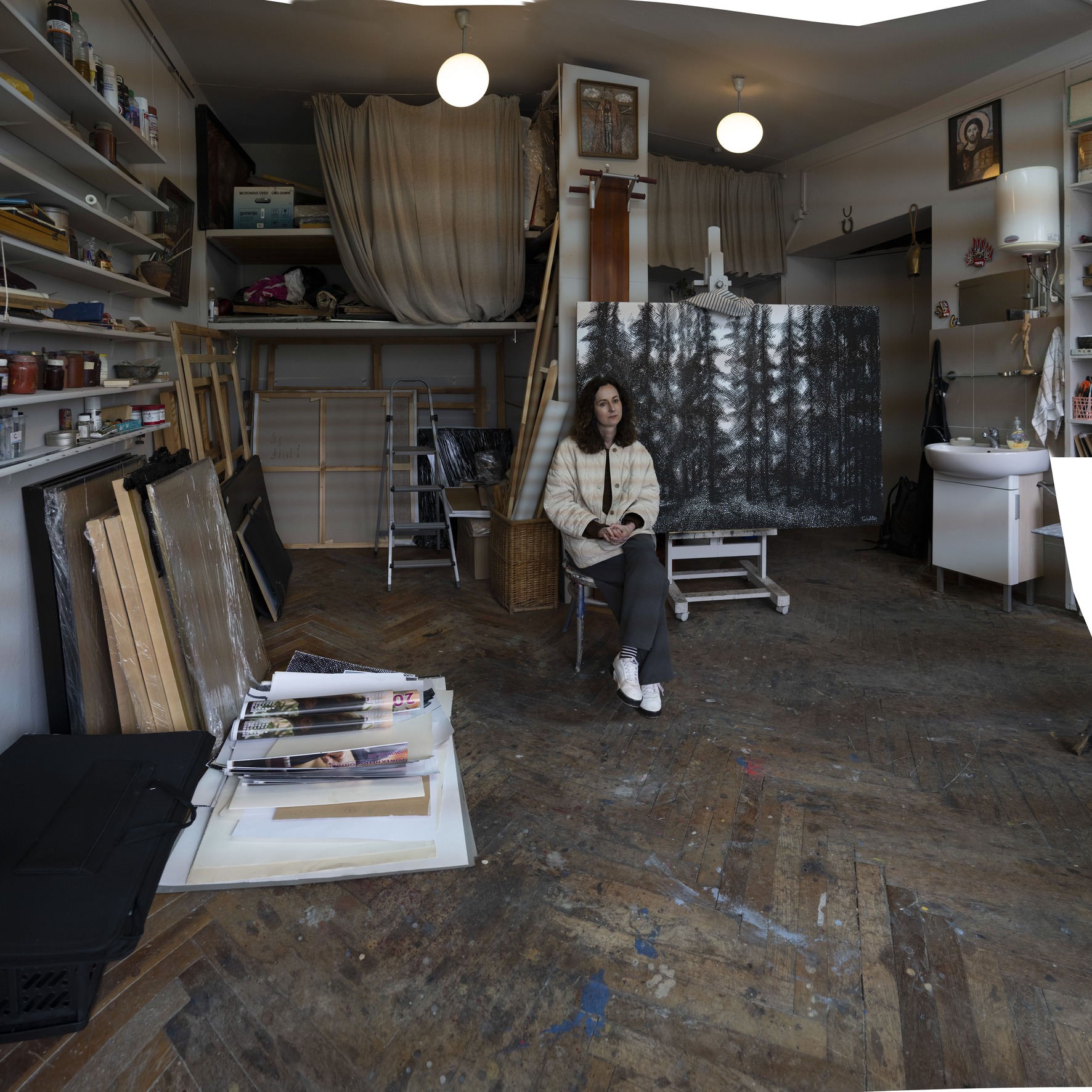Марина Талютто
Maryna Talutto
«У мистецтві має бути простір для надії, бо жити в постійній депресії неможливо».

З серії «Before the Future», 2025
Друк на Hahnemuhle Photo Rag Metallic, Dibond
Війна роз’єднала сім’ю: Марина з донькою виїхала за кордон, а її чоловік, іконописець, приєднався до територіальної оборони. Це було перше серйозне рішення, яке він прийняв без неї, але іншого шляху для себе не бачив. Згодом, його підрозділ увійшов до складу ЗСУ, і життя родини змінилося безповоротно.
Еміграція тривала півтора року. Відчуття ізольованості та віддаленості від подій, від чоловіка, сформувало усвідомлення необхідності повернутися додому.
Після повернення до Києва, буденність стала складнішою. Це був період блекаутів, частих нічних обстрілів. Якісний сон зник повністю. У таких умовах тривожність наростає разом із фізичним виснаженням. Усе це робить життя тягучим, де не видно кінця цим випробуванням. До цього додається постійне очікування новин з фронту: чоловік проводить у бліндажах по 10–14 днів без можливості вийти через дрони. Стрес і безсоння – фоновий стан.
А ще фінансова нестабільність, що ускладнює доступ до психологічної підтримки. Психологічні програми для військових родин практично не працюють. А особисті спроби знайти допомогу через фонди, часто наштовхуються на відмови, адже занадто багато запитів.
І тут рятує повернення до себе через прості мистецькі практики, особистий проєкт «Прості речі». Він без тягаря пояснень та без складних концепцій, просто зображення звичайних предметів побуту та інтер’єру: чашок, аркушів паперу, пляшечок від парфумів. Швидкі замальовки, де процес стає способом не думати надто багато, надто концептуально, а просто бути й не розчинятися в тривозі.
Війна стала не лише особистою травмою, а й новим імпульсом до творчості. Катастрофа або ламає, або штовхає вперед. У її випадку це був поштовх до руху.
Разом із галеристкою, яка залишалася в Україні, Марина допомагає організовувати регулярні благодійні аукціони, спрямовані на підтримку митців, що воюють. На одному з них зібрано кошти на авто для бригади її чоловіка.
Саме мистецтво набуло глибоко особистого характеру. Один із проєктів присвячений стосункам між батьком та донькою, яка шалено сумує за ним. У ньому – відео про евакуацію з Києва, кадри з передової, інсталяції листів, що символізують спілкування на відстані. Донька важко переживає розлуку з батьком, ставить складні питання: чому інші тати були на шкільній лінійці, а її – ні? У таких моментах болісно проявляється те, чого не компенсує жодна сила волі. Марина намагається створити вдома відчуття нормальності, щоденно тримаючи фронт, який ніхто не бачить.
Кожен день – це пошук балансу. Не застрягати в драмі, але й не втратити глибину. У мистецтві має бути простір для надії, бо жити в постійній депресії неможливо.
‘There must be space for hope in art — because living in permanent depression is impossible.’
The war fractured Maryna Talutto’s family. She left the country with her daughter, while her husband, an icon painter, joined the Territorial Defence Forces. It was the first major decision he made without her — yet he saw no alternative. Later, his unit was integrated into the Armed Forces of Ukraine, and their family life changed irrevocably.
They spent a year and a half in emigration. The feeling of distance — from the events of war, from her husband — deepened her awareness of one pressing truth: they had to return home.
Upon returning to Kyiv, everyday life became more difficult. It was the season of blackouts and constant nighttime attacks. Quality sleep disappeared entirely. In such conditions, anxiety and physical exhaustion compounded one another, making life feel stretched and unending. There was also the constant wait for updates from the front: her husband often spent 10 to 14 days in a dugout with no chance to come out due to the presence of drones. Stress and insomnia became a persistent backdrop.
Adding to it all was financial instability, which made access to psychological support even harder. Mental health programs for military families were virtually nonexistent. Her personal attempts to seek help through aid foundations often ended in rejection — demand had far outstripped capacity.
In this fragile space, she found grounding by returning to herself through small artistic rituals — her personal project Simple Things. It carries no burden of explanations, no complex conceptual scaffolding. Just images of everyday items: cups, pieces of paper, perfume bottles. Quick sketches, where the act of drawing becomes a way not to overthink, not to intellectualise — but simply to be, and not dissolve into anxiety.
War was not only a personal trauma but also a renewed creative impulse. Catastrophe either crushes or propels forward. For her, it became momentum.
Together with a gallerist who remained in Ukraine, Maryna began organising regular charity auctions to support artists who are now on the front lines. One of them raised funds to purchase a vehicle for her husband’s brigade.
Art became deeply personal. One of her projects was dedicated to the relationship between a father and daughter longing for each other. It included video footage of their evacuation from Kyiv, scenes from the front line, and an installation of letters representing their distant communication. Her daughter struggled with the separation, asking painful questions: why were other dads at the school ceremony, but not hers? These moments revealed wounds that no strength of will could compensate for. Maryna works hard to create a sense of normalcy at home — holding the emotional frontline that no one sees.
Each day is a search for balance. Not to drown in drama, but also not to lose depth. Art must hold space for hope — because to live in constant depression is unsustainable.